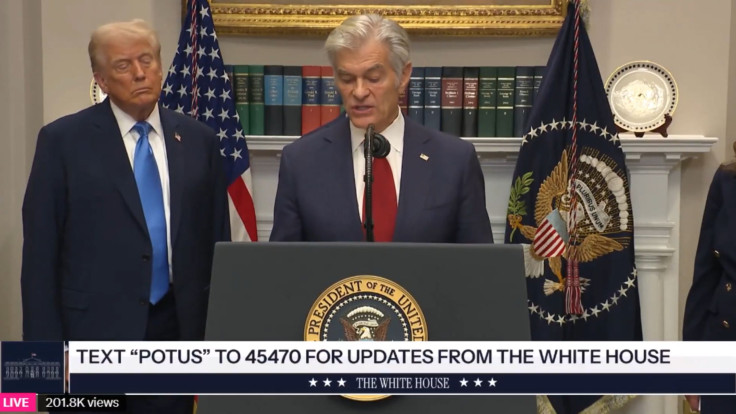Trump Administration Backs Leucovorin for Autism — How It Works, the Science Behind It and Its Effectiveness
FDA reapproves leucovorin for autism-related use, sparking hope for families but caution from scientists who warn evidence is still early.

The Trump administration has unveiled sweeping new health guidance aimed at tackling autism in the United States, combining warnings about the painkiller paracetamol with the promotion of leucovorin, a decades-old drug now repurposed to treat a rare neurological condition with autistic features.
The announcement, hailed by supporters as bold but criticised by experts as premature, underscores the administration's pledge to confront what officials call America's 'skyrocketing rates of autism'.
Paracetamol Under Scrutiny
In a press briefing, White House Press Secretary Karoline Leavitt said: 'The Trump Administration does not believe popping more pills is always the answer for better health. There is mounting evidence finding a connection between acetaminophen use during pregnancy and autism — and that's why the Administration is courageously issuing this new health guidance.
Additionally, the Trump Administration is approving a new treatment option that has been found to improve some autism symptoms.'
Paracetamol, also known as acetaminophen or by the US brand name Tylenol, has long been considered the safest option for pain and fever during pregnancy.
But Trump officials now warn expectant mothers to avoid it unless absolutely necessary. The claim has drawn sharp criticism from medical bodies, which point out that large-scale studies do not support a causal link and that untreated fever itself can be dangerous for both mother and baby.
Leucovorin's New Role
The other half of the administration's autism initiative is leucovorin, also known as folinic acid, a synthetic form of vitamin B9 that has been used for decades to offset chemotherapy toxicity and treat certain forms of anaemia.
The US Food and Drug Administration (FDA) announced that it has initiated the process to approve leucovorin calcium tablets for cerebral folate deficiency (CFD), a rare disorder that disrupts folate transport into the brain.
Patients with CFD often present with developmental delays, seizures, motor coordination problems and behavioural challenges, including autistic features such as impaired social communication and repetitive behaviours. By restoring folate metabolism in the brain, leucovorin has shown promise in improving some neurological symptoms.
.@DrOzCMS: “@US_FDA, based on @NIH research, is approving prescription leucovorin for treatment of autistic children.” pic.twitter.com/pWLE97rP9M
— HHS.gov (@HHSGov) September 22, 2025
What the Science Says
The FDA said it conducted a systematic review of research from 2009 to 2024, including case reports and mechanistic data, and concluded that leucovorin can benefit patients with CFD.
'We have witnessed a tragic four-fold increase in autism over two decades,' said FDA Commissioner Marty Makary. 'Children are suffering and deserve access to potential treatments that have shown promise. We are using gold standard science and common sense to deliver for the American people.'
The FDA is working with GSK, the manufacturer of Wellcovorin, to broaden the drug's label so that it includes both adult and paediatric CFD patients. GSK has 'preliminarily agreed' to cooperate in the relabelling process.
George Tidmarsh, Director of the FDA's Center for Drug Evaluation and Research, added: 'This effort reflects the FDA's commitment to identify opportunities to repurpose drugs to treat chronic diseases. The FDA remains committed to finding and treating the root causes of autism.'
Autism Overlap But Limited Evidence
While CFD is not autism, some patients with CFD have antibodies that block folate receptors in the brain, producing symptoms that overlap with autism spectrum disorder. This overlap has made leucovorin an object of interest in autism research, particularly for children with folate-related metabolic issues.
The FDA cautioned, however, that evidence for leucovorin's use in autism more broadly remains limited and that additional controlled trials are needed. Small studies suggest it may improve communication and behaviour in subgroups of autistic children, but experts warn against treating it as a one-size-fits-all therapy.
Hope and Caution
For families living with CFD, the FDA's decision offers hope of better access to a therapy with documented benefits. For the autism community, it represents a potential tool but also a reminder that scientific validation takes time.
Critics argue that the Trump administration risks overselling leucovorin's promise by linking it directly to autism in public messaging. The Autism Science Foundation and other groups caution that expectations should be tempered until stronger evidence emerges.
Bottom Line
The Trump administration's initiative pairs a controversial warning about paracetamol with a high-profile push for leucovorin, framing both as part of a broader autism strategy. While leucovorin is now on track to be officially recognised for cerebral folate deficiency, it is not yet approved as a treatment for autism.
Whether it ultimately delivers on its promise will depend on larger, rigorous trials. Until then, families are urged to consult medical specialists before considering leucovorin — and to separate political messaging from scientific evidence.
© Copyright IBTimes 2025. All rights reserved.





















